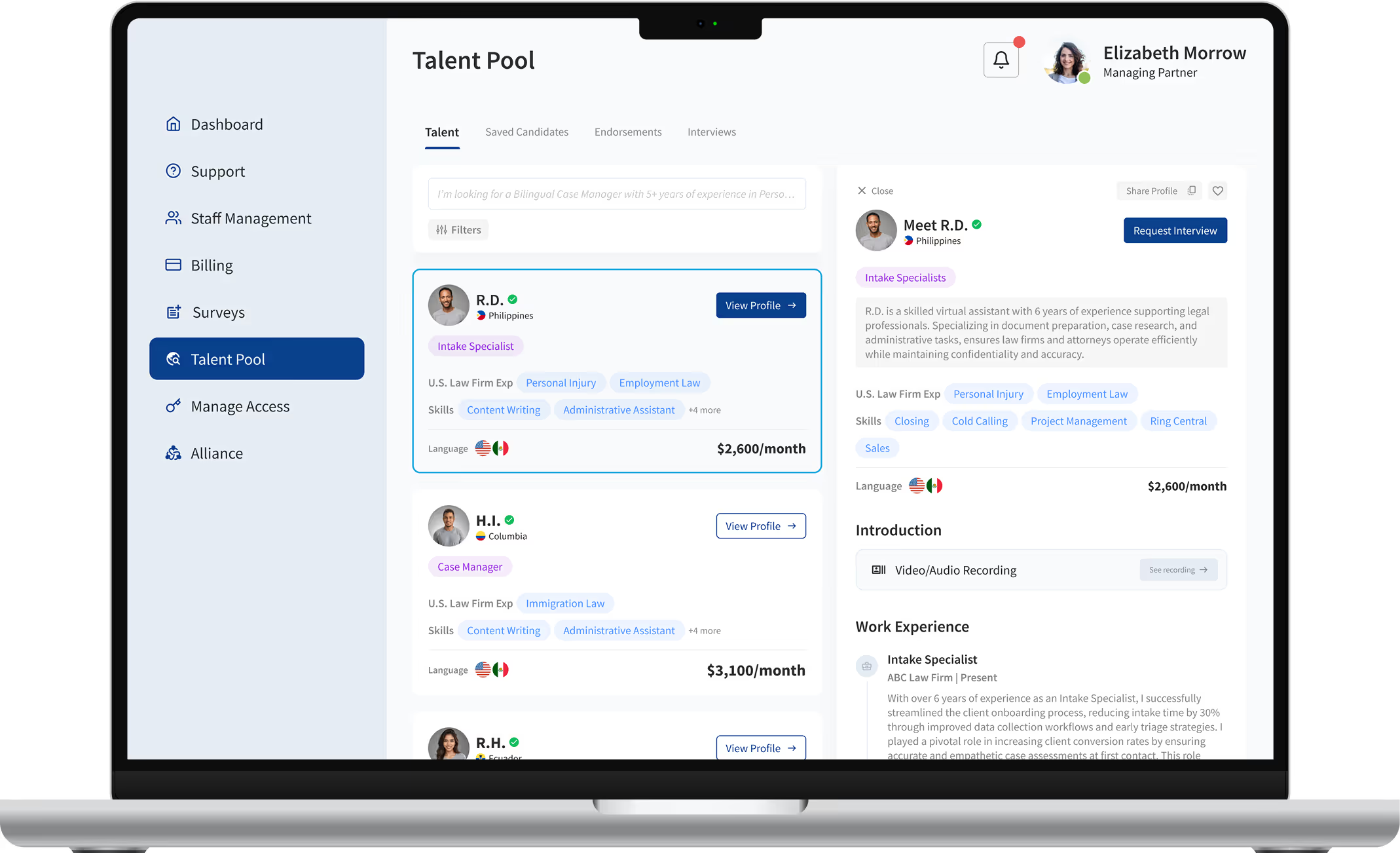
Bank Reconciliation Services that Keep Your Books in Check
Are you spending too much time reconciling bank statements and tracking financial transactions? Our dedicated bookkeepers handle the heavy lifting for you, ensuring your records are accurate and up to date.

Trusted by 1000+ Fast-Growing Law Firms
Transparency & Compliance
Our services follow industry’s best practices to minimize financial risks and errors.
Certified Professionals
Our team consists of certified accountants with legal financial management expertise.
Save Time & Money
Reduce your admin & accounting costs by up to 60% by outsourcing your bank reconciliation.
Our Bank Reconciliation Services
We help law firms and businesses maintain accurate financial records through customized reconciliation services for your needs.
Full Reconciliation
Complete matching of all transactions between your accounting records and bank statements.
Partial Reconciliation
We reconcile specific accounts or time periods, addressing concerns and maintaining clarity.
Deposit Reconciliation
Verification that all deposits recorded accurately matched those processed by your bank.
Bank Statement Reconciliation
Systematic comparison of your internal financial records with bank statements.
Loan Account Reconciliation
Carefully tracks and verifies your loan payments, interest charges, and remaining balances.
Intercompany Reconciliation
Comprehensive verification of transactions between related business entities.
Credit Card Reconciliation
Detect unauthorized charges, errors, or missing transactions through precise matching.
Vendor Payment Reconciliation
Confirm all vendor payments are recorded, processed, and match agreed-upon terms.
Daily, Weekly, or Monthly Bank Reconciliation
Flexible schedules that align with your transaction volume and business workflow.
What You Get
Identify Discrepancies & Risks
Catch errors, unusual transactions, or potential fraud through our process that protects your finances.
Generated Detailed Reports
Receive reports that provide clear visibility into your financial status for informed decisions and planning.
Improved Cash Flow
Maintain accurate balances to avoid overdrafts or cash shortages that can impact operations.
Resolved Outstanding Transactions
Identify and resolve outstanding transactions, such as checks, deposits, or transfers that haven’t yet cleared.
Better Budgeting
Build the foundation for realistic budgeting and planning, so you can allocate resources more effectively.
Flexibility and Scalability
Hire an expert bookkeeper on a full-time or project basis with no long-term commitment required.
Proficient in the Accounting Tools You Use


























In-House vs. Virtual Bookkeeper
Our virtual bookkeepers start at just $14/hour, offering a cost-effective way for bank reconciliation without hiring additional in-house staff.
Feature
Hourly Rate
Commitments
Hidden Fees
Quality
Dedicated
Virtual Bookkeeper
- $14 per hour
- No
- Transparent
- High
- Always
Feature
Hourly Rate
Commitments
Hidden Fees
Quality
Dedicated
In-house Bookkeeper
- $25+ per hour
- Requires contracts
- Extra costs
- Low - High
- Sometimes
Process
How It Works



Testimonials
Hear from our clients
Learn more about our clients' bookkeeping and accounting journeys to see how we've transformed the way they operate.
What Our Bookkeeping Assistant Do for Your Firm

FAQs
Frequently Asked Questions
What is a bank reconciliation?
Bank reconciliation is the process of comparing your own financial records with your bank statements to ensure all transactions match. It is used to identify and resolve any discrepancies between the two sets of records and detect potential issues such as missing entries or fraud.
What is the primary purpose of a bank reconciliation?
The main purpose of a bank reconciliation is to verify the accuracy of your financial records and detect discrepancies between your books and bank statements. This process helps prevent fraud, identify missing or duplicate transactions, and provide a clear picture of your available funds.
What is a bank reconciliation statement?
A bank reconciliation statement is a document that shows the comparison between your accounting records and bank statement, explaining any differences and adjustments made between the two. It typically includes:
- Your book balance and bank statement balance
- Outstanding checks and deposits
- Bank fees, interest earned, and other transactions
- Reconciled balance that confirms accounting accuracy
How often should bank reconciliation be done?
The frequency depends on your business needs. Ideally, bank reconciliations should be done monthly when statements are issued. However, businesses with high transaction volumes may benefit from weekly or even daily reconciliations to catch errors early and avoid accounting complications, so you have enough time to correct it.
What are outstanding checks in bank reconciliation?
Outstanding checks are checks that have been written and recorded in your accounting system but haven't yet cleared or been processed by the bank. During reconciliation, these are noted as adjustments to the bank statement balance to account for funds that will be deducted from your account when the checks are processed.
- Contact debtors via phone, email, mail, and text
- Negotiate payment plans and settlements
- Send professional reminders
- Locate hard-to-find debtors
- Report delinquent accounts
- Prepare documentation for potential legal action
- Provide detailed accounting of all collection efforts
- Ensure compliance with all relevant regulations
How to do a bank reconciliation?
Here’s a basic step-by-step process for bank reconciliation:
- Gather your financial records and bank statements
- Compare each transaction in your records to the bank statement
- List outstanding checks and deposits in transit
- Investigate any unexplained discrepancies
- Adjust your records for outstanding items or errors
- Verify that the adjusted balances match
- Document the reconciliation process for your records















